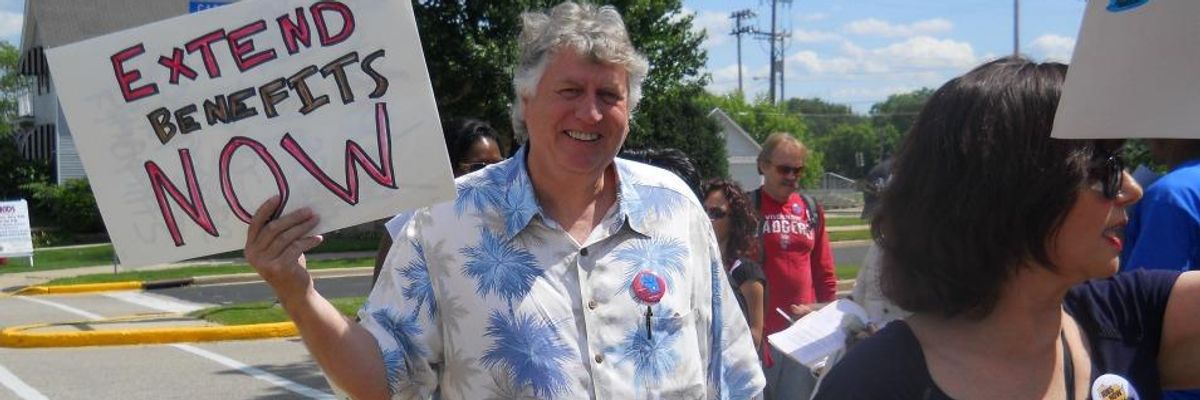As we take a three day weekend to celebrate those who labor, let us take a moment to remember the families who won't be planning picnics or a last trip to the beach. Despite some positive economic indicators, 9.7 million Americans are still out of work, almost a third for more than six months. More than seven million more have taken part-time work at poor wages to make ends meet even though they need full time work to pay the bills. And three-quarters of a million more have little hope and have given up looking for work and as a result are no longer counted as "unemployed." (They are just "out of the labor force.")
For most Americans, losing a job is traumatic and painful, disorienting and frightening. But long-term unemployment brings financial catastrophes in its wake. Unemployment benefits, when available, rarely provide more than half a workers' previous income. And state unemployment benefits usually last 27 weeks or less. The federal government usually steps in to provide another six months. But the program was not included in last December's 11th hour budget deal.
Despite promises to address the issue in early 2014, no legislation authorizing extended benefits to help the over 3 million workers searching for work for over six months has passed Congress. The Senate has passed two bills, but the House Speaker has steadfastly refused to allow the full House to pass on $10 billion extension to the emergency unemployment insurance program. Members report the extension would pass if a vote were allowed; it would incredibly hard to vote against such assistance and then face your constituents in an election.
What makes this particularly bitter and unconscionable is what the House has passed instead. Since the end of the year, more than $500 billion in corporate tax cuts have been approved by the majority of the Members of the House-- none of them have been paid for with cuts elsewhere in the budget. Congress is willing to borrow money for tax breaks for corporations but not to assist struggling working families - with unemployment assistance or minimum wage increases.
This means the long-term unemployed soldier on while the internet they need to search for jobs gets cut, they exhaust savings, college funds, retirement accounts to pay the rent or mortgage, and they have to choose between groceries and transportation money to get to job interviews.
This is wrong. It's un-American. And it hurts people.
My organization, the Center for Effective Government, has collected stories from the people who need extended unemployment. We delivered them to Members of Congress and for seven weeks this summer, we stood with more than 80 non-profit leaders, faith leaders, labor leaders and Members of Congress in the shadow of the Capitol dome to read their stories and bear witness to their voices and hardship. Here is a selection of what we heard at our Witness Wednesday events:
- "I do not want to lose my home that my husband and I raised our children in, but it will come to this without help." Lynda in Ohio
- "I worked hard and paid taxes all my life, [and this is how] our Government rewards us? This is not the American Way I grew up to understand. I haven't paid my rent this month, and, of course, gas, electric, cell phone, and others are due. Even worse, I have no gas to get to an interview, if I got one. I know my story is not different from the many Americans that are out there." Darryl, a U.S. Navy veteran, in Nevada
- "Last month my husband pawned his wedding ring for $75 worth of gas money." Alisa in California
- "I feel like a failure to my children. They have never seen their mother in hard times like this." Gigi in Texas
- "My kids can't go on class trips because I can't pay for it! My kids didn't get their school pictures because I had a negative bank account when the money was due! And now my 7 week old is lucky to get a bottle of formula from a family member!" Joseph in New Jersey
Unemployment insurance is not a government hand-out. It is a public insurance program paid-for by employers with federal help, knowing that the economy has ups and downs, that companies sometime fail, and workers will need support as they look for new work. Having unemployment insurance gives people the chance to bounce back from job loss. It provides money to keep families in their homes and paying a few bills, so job searching can continue.
Unemployment insurance also protects communities and local economies. A plant closing hurts everyone in a community, not just those employed at the firm. When families no longer have money to spend in supermarkets and other local stores, other current workers' jobs are put at risk. When someone can't pay her mortgage, the bank suffers too, and property values in the neighborhood declines. The failure to renew unemployment assistance will cost an estimated 240,000 in jobs this year.
Congress will soon come back from their five week long break, work just eight days, and then recess again to campaign for the November election.
When you come across your representatives on the campaign trail, ask them if they value working people. Ask them what they are doing to help American families and communities who are still struggling to recover from the Great Recession.
Tell them that attending a Labor Day parade won't cut it anymore. American workers need a government that works for them, that cares about their families, their children, their neighborhoods.
Tell them that's what you'll be thinking about when you enter the voting booth in November.

